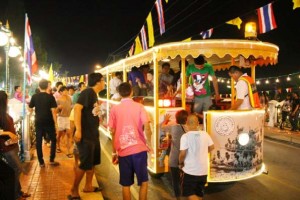
The Muangklang Low Carbon Town project, an initiative of the municipal mayor, Somchai Chariyacharoen, has launched a comprehensive program including solid waste reduction, water and air quality improvement programs, implementation of natural gas vehicles, and overall quality of life improvement programs.
By 2020, Muangklang aims to be a green, sustainable and low carbon city with low levels of waste, high energy efficiency and sustainable levels of consumption. Muangklang also aims to be a learning centre for Low Carbon Cities for other local governments within Thailand as well as the Greater Mekong region.
To realise Muangklang’s vision of becoming a sustainable low-carbon city, the knowledge of municipal officers and community leaders on low carbon city development need to be strengthened rapidly. In parallel, continuous efforts need to be invested to raise the awareness of the public, particularly women and youth groups. The ASEAN ESC Model Cities programme will support targeted training activities building on the municipality’s existing efforts in low carbon development and urban agriculture.
Specific Goals
- Increase the sustainable green area by 20 sq.m. per capita by 2015 and 30 sq.m. per capita by 2020
- Decrease waste generation to less than 1 kg per capita
- Increase the pre-landfill waste sorting capacity by at least 20%
- Increase food production from utilizing locally produced compost by 10% and intensify the campaign for urban agriculture
Main Activities
- Workshops on ‘Green, Clean and Low Carbon City Development’ for four target groups
- Training and study visit on urban organic agriculture
Expected results
- Development of concrete plans, including for pilot projects on low carbon city development by trained target groups.
- Integration of low-carbon concepts and goals into the municipality’s 1.5 and 5-year development plan
- At least 30 farmers trained in organic urban agriculture
Waste Management
- Muangklang Municipality has instituted a comprehensive but low-cost system of solid waste management which covers composting as well as reuse and recycling managed by dedicated workers.
- Compost is sold to farmers, while methane gas captured from the composting process displaces conventional fuel sources at the municipal slaughterhouse, helping to lower operational costs.
- Vegetable and fruit scraps from markets are used to produce ‘Effective Microorganism’ concentrate which is applied to rivers and municipal sewers to improve water quality.
Urban Agriculture and Greenery
- Self-sufficiency and reliance on local capacity are cherished principles.
- The city promotes rice farming as well as urban agriculture for producing organic vegetables to supplement the local food supply.
- Abandoned areas are being actively greened with trees and plants.
Green Public Transport
- Public buses powered by natural gas have been introduced to boost public transport usage and reduce traffic of private vehicles.
- The buses are brightly-coloured and traditional-looking with a charming tram-like appearance.
Key Stakeholders: Municipal staff, community leaders, teachers, student leaders, professional bodies and research institutes